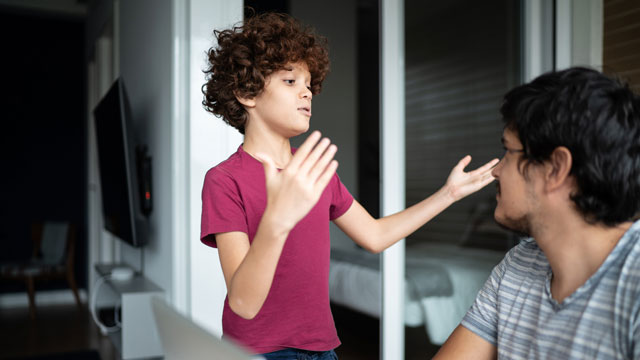Remember the little being who followed you everywhere, depended on you for everything, and probably thought you could do no wrong? Well if that little being is now a big kid, you’ve likely noticed that none of that applies anymore. Gone are the days of the child you created gazing at you lovingly, wanting only to be by your side. Enter a small human who is finding their independence, experiencing changing hormones for the first time, and coincidentally, finding everything you do annoying.
This is not an easy time for parents. But you’d do yourself a favor to remember that it’s an even harder time for kids and be careful not to poke the bear. The tween years are a time when parents really need to be the adult in the room, and sometimes that requires disregarding your feelings and carefully communicating with your child. Here are a few things you should never say or do when dealing with a pissed-off kid.
1. Don’t tell them, “It’s not a big deal.”
Your tween should be given the space to have feelings and react to things. Saying “it’s not a big deal” invalidates those feelings. According to Dr. Lauren Allerhand PsyD, a clinical psychologist at the Child Mind Institute, “The absolute number one thing is validation. Our emotions are a communication tool. They let the other people know how we feel and help us get our needs met.” Foster a safe space for your child to tell you what’s bothering them without feeling belittled or brushed aside. This is the kind of reinforcement we crave even as adults.
2. Don’t take things personally.
As our kids grow up, they grow into their independence, which is a good thing. But it’s totally normal for parents to feel rejected at times. When your child lashes out or needs their space, don’t take it personally. “All too often parents personalize some of the distance that occurs and misinterpret it as a willful refusal or maybe oppositional behavior,” says Catherine Steiner-Adair, a Harvard psychologist. “This is a time when children really start to have secrets from us, and parents who have a low tolerance for that transition—they want to know everything—can alienate their children by being too inquisitive.”
3. Don’t match their anger with anger.
It can be difficult when your child becomes angry at the drop of a hat or seems to overreact to the smallest inconvenience. But it’s super important to remember that your growing child is less equipped to handle big feelings than you, as an adult, are. “The prefrontal cortex, which is the part of our brains involved in problem-solving and impulse control, isn’t fully developed until your mid-to-late 20s. Adolescents are also flush with hormones like testosterone and estrogen, which can have a significant impact on mood,” Dr. Allerhand says.
4. Don’t try to control your child’s emotions.
Has anyone ever effectively been able to control your emotions? The answer is probably “no.” So why do we sometimes expect that we can control the way our kids feel? “It’s okay and natural for a child to be angry at times, as long as that anger is expressed appropriately,” advises Empowering Parents. “So, do not ask, ‘How do I prevent my child from getting angry?’ Instead, ask, ‘How do I get my child to behave appropriately when they get angry?'”
Related: 9 Tween Behaviors Parents Shouldn’t Ignore

5. Don’t tell them to “calm down.”
This doesn’t work with toddlers, it doesn’t work with young kids, and it doesn’t even work with adults. “It tells the child that expressing emotions is not accepted or appropriate. It tells the distressed child to stop because they are ‘too much,'” says Rachael Snyder, a clinical psychotherapist specializing in teen anxiety, depression, and trauma. “There are adults who hold in or bottle up their emotions because, at one point in their life, they were told it’s not OK to express those.”
6. Don’t center your own feelings.
Yes, your teen watched the entire season of The Baby-Sitters Club after repeatedly refusing your excited invitations. Then you may have said, “Why did you watch this without me when I’ve been begging you to watch it with me for months?” At which point your tween rolled their eyes at you, sighed like they’ve never been so inconvenienced, and marched back to their room. This could easily devolve into a fight, and it’s a good time to remember that your tween doesn’t hate you or hate spending time with you. Step back and resist centering yourself.
7. Let them vent.
As a parent, it’s hard not to try to make things right. We’re so used to tending to the needs of our infants, toddlers, and young children that we have a hard time recognizing when they’ve grown out of that necessity. Think about yourself here and how often you just need your friends and family to be a sounding board for what you’re going through. Give your kids the benefit of this—and allow them to vent to you without attempting to “fix” whatever is wrong.
Related: 9 Ways to Build Trust with Your Tween











